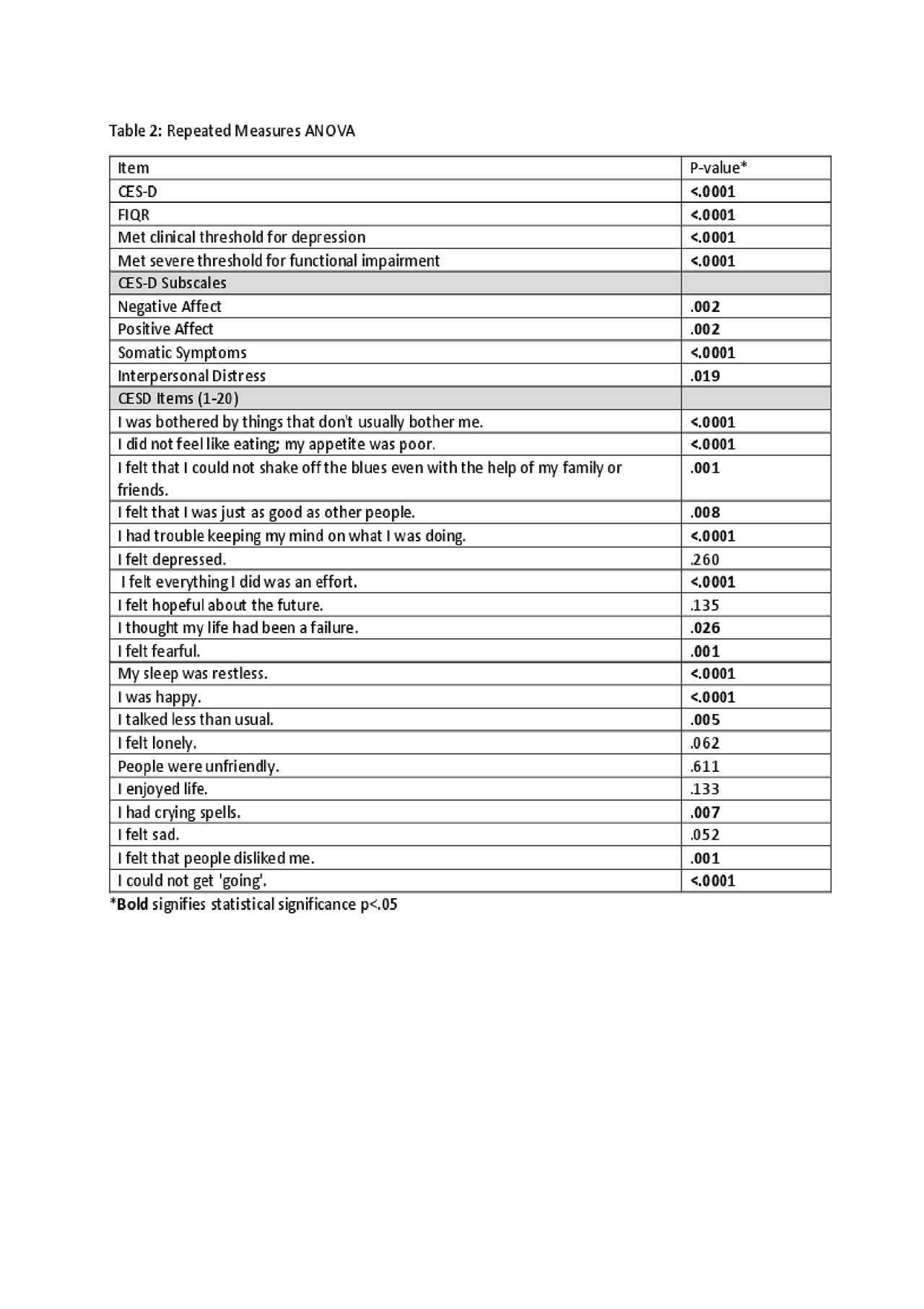Session Information
Session Type: Poster Session (Sunday)
Session Time: 9:00AM-11:00AM
Background/Purpose: The study was designed to evaluate the effectiveness and durability of an intensive cognitive behavioral intervention on functioning and depression in patients with Fibromyalgia (FM). Despite significant statistical improvements observed in functional status and level of depression, high rates of depression remained at follow-up. Analyses were designed to determine why depression rates remained high in order to identify more effective interventions
Methods: The patients included in the study were 141 adults with a diagnosis of FM who participated in an intensive two day treatment program for FM provided at a tertiary medical center. The Center for Epidemiologic Studies of Depression Scale (CES-D) and the FM Impact Questionnaire-Revised (FIQR) were completed at the time of admission to the 2-day structured FM Treatment Program and at 3 and 6 month follow-up. The FM Treatment Program is a cognitive behavioral treatment program that focuses upon strategies to decrease central sensitization including management tools to decrease pain, fatigue, assist with sleep disturbance and improve cognitive issues associated with FM. Strategies of behavioral activation, exercise, sleep hygiene and cognitive strategies are integral aspects of the treatment program.
Results: Table 1 contains demographic information for the sample. As seen, patients were majority (85.1%) female and the average age was 52.26 years. Table 2 shows statistically significant improvements (p< 0.001) in depression levels (CES-D) and functional status (FIQR) at both 3 and 6 month follow up. 79.4% of patients met the clinical threshold for depression at intake. Following intervention, 52.5% and 53.9% of patients met the clinical threshold for depression at 3 and 6 month follow-up, respectively. As in Table 2, there was a significant effect of treatment on each of the CES-D subscales (Negative Affect: p=.002, Positive Affect: p=.002, Somatic Symptoms: p< .0001, Interpersonal Distress: p=.019). Of 20 CES-D items, 14 were significantly improved by treatment (p< .05). 6 items did not change significantly after treatment: ‘I felt depressed,’ ‘I felt hopeful about the future,’ ‘I felt lonely,’ ‘People were unfriendly,’ ‘I enjoyed life,’ ‘I felt sad’ (p >.05) (Table 2). Three paired samples t-tests with Bonferroni corrections to make post hoc comparisons between time points for each significant effect (Table 3).
Conclusion: The intensive CBT treatment program was successful in improving functional impairment and psychological distress in a sample of Fibromyalgia patients. The improvements were maintained at 6 month follow-up. Despite statistically significant improvements in levels of depression, more than half of subjects continued to meet the clinical threshold for depression following CBT intervention. While CBT is regarded as the gold-standard treatment for depression in Fibromyalgia, some patients may require additional strategies for improvement. Factors important to address in this population to improve treatment effectiveness are contained in Table 2.
To cite this abstract in AMA style:
Bruce B, Allman M, Gehin J, Oliphant L, Rivera F, Abril A. Intensive CBT Is Effective in the Treatment of Significant Functional Impairment and Psychological Distress Found in Fibromyalgia: But Can We Improve Depressive Symptoms? [abstract]. Arthritis Rheumatol. 2019; 71 (suppl 10). https://acrabstracts.org/abstract/intensive-cbt-is-effective-in-the-treatment-of-significant-functional-impairment-and-psychological-distress-found-in-fibromyalgia-but-can-we-improve-depressive-symptoms/. Accessed .« Back to 2019 ACR/ARP Annual Meeting
ACR Meeting Abstracts - https://acrabstracts.org/abstract/intensive-cbt-is-effective-in-the-treatment-of-significant-functional-impairment-and-psychological-distress-found-in-fibromyalgia-but-can-we-improve-depressive-symptoms/



